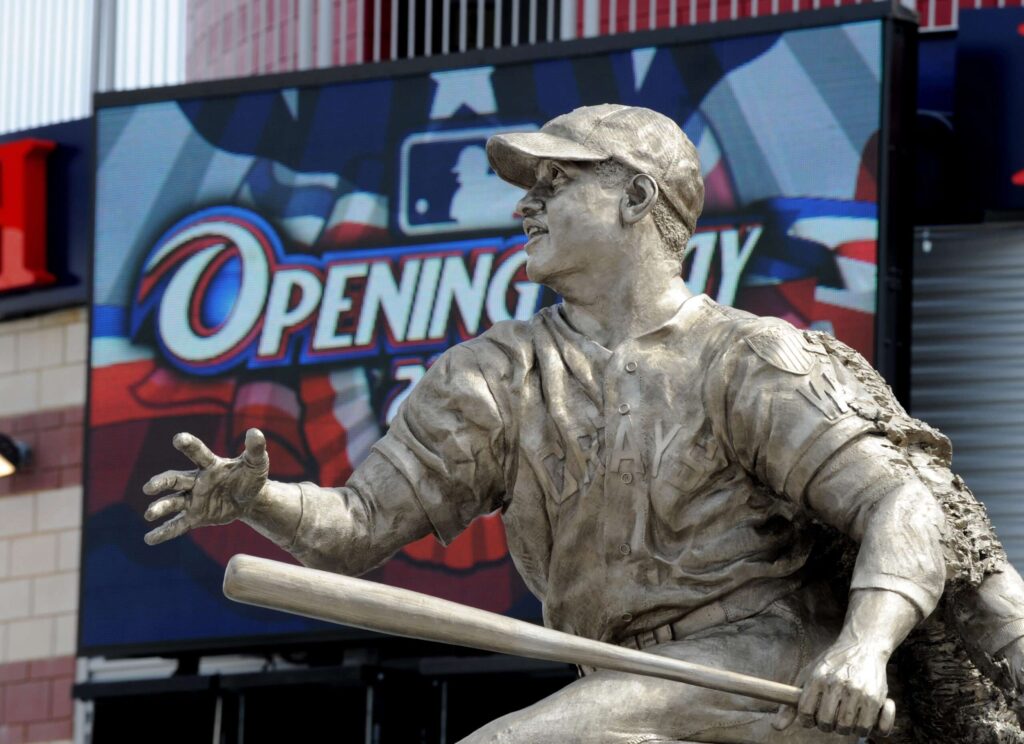Josh Gibson died in January 1947, just over three months before Jackie Robinson broke professional baseball’s so-called “color barrier.”
Despite never having played an inning in either of the leagues that make up Major League Baseball (MLB), Gibson is officially recognized as the player with the highest career batting average in MLB history, hitting .372 while in the Negro Leagues, beating the previous record of .367 held by Ty Cobb by several points.
Gibson’s rise to the top of the batting average charts is somewhat of a contradiction in terms, but it’s an awkward consequence of MLB’s decision earlier this year to officially elevate the Negro Leagues (a collection of various leagues that existed in the first half of the 20th century when non-white players were barred from the National and American Leagues) to the “major leagues,” which has resulted in Gibson and other Negro League stars finding recognition alongside players like Babe Ruth (who played before the MLB was integrated) and Hank Aaron (who played after the MLB was integrated).
In announcing the decision, MLB Commissioner Rob Manfred said the goal was to “ensure that future generations of fans will have access to the statistics and milestones of all those who helped make the Negro Leagues possible.”
It’s a decision that should be understood as an attempt to apply some justice to professional baseball’s past sins of racism, but it’s also a decision that underscores the impossibility of righting wrongs after the fact.
The bottom line is that Gibson may deserve to be recognized as the greatest hitter in baseball history. He was certainly a great talent. But what he really deserved was a chance to play against the best players of his generation, regardless of skin color. Nothing can fix that now.
I’m thinking about this today because MLB is hosting a special game tonight at Rickwood Field in Birmingham, Alabama, the former home field of the Birmingham Black Barons, one of the top teams in the Negro Leagues. Tonight’s game is to celebrate a complicated chapter in baseball history, and in particular to honor the late Willie Mays, who played in Birmingham before joining the San Francisco Giants.
A celebration of that history is long overdue but welcome, as are other celebrations more broadly focused on the end of systemic racism, which MLB does each year on April 15, the anniversary of Robinson’s debut for the Brooklyn Dodgers. Think of it as baseball’s version of Juneteenth.
But changing the record books feels a bit wrong to me. It seems contrived and right, while obscuring actual history and the fact that the institutions that currently promote Gibson (and other black stars from the pre-integration era) are the same ones that once shut them out.
Maybe that’s progress, and maybe, even without a time machine, it’s the best we can do under the current circumstances.
Still, the dilemma raised by the rewriting of MLB’s record book reflects the broader difficulty of confronting America’s racist past. Baseball’s experience is a useful thought experiment because it removes some of the elements that complicate debates over policies like reparations: No one is actually harmed by the rewriting of MLB’s record book; no wealth is being redistributed.
So why is it so unsatisfying?
I think part of the answer is because it seems so obviously fake. We don’t know what Gibson’s career batting average would have been if he’d been allowed to play in the integrated major leagues, or, for that matter, what Cobb’s batting average would have been, or how many home runs Ruth would have hit, if they’d faced the best pitchers, not just the best white pitchers.
Malcolm Ferguson, writing in The Atlantic, suggests that the only fair way to settle this history is to create separate records for pre- and post-merger MLB.
This would be the right answer to the serious question of baseball records, but of course MLB is a private institution and has the right to include or exclude any records. According to the records, a ranking of the greatest hitters in post-integration MLB history would place Ted Williams (white) at the top and Tony Guynh (black) at number two. Few baseball fans would disagree with this ranking, and it reflects the widely held belief that they were the best hitters of their eras.
Unfortunately, other injustices around systemic racism are harder to resolve than rearranging names on a list. In a broader context, the complexities of baseball’s record-breaking saga should serve as a reminder of why it’s so important to speak out against injustices in the moment they occur, because attempts to right the past after the fact will always be incomplete and unsatisfying.
Acknowledging Negro League statistics doesn’t do true justice to a player like Josh Gibson. We’ll never know what his career would have been like had systemic racism not robbed him of opportunities he’ll never get back. It’s also not fair to baseball fans who will forever be denied the chance to see what he accomplished against the best players of all races.


